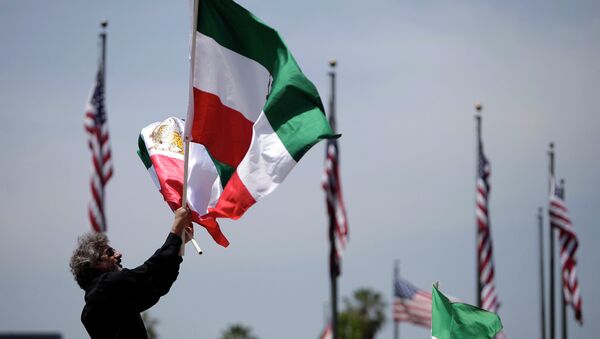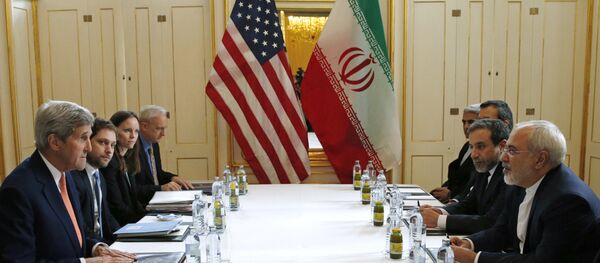"The Islamic Republic of Iran will honor the JCPOA as long as it enjoys the benefits of the JCPOA," Araghchi was quoted by Tasnim News Agency as saying.
Ali Akbar Salehi, Vice-President of Iran and head of its Atomic Energy Organization, said in turn that Americans are trying to force Iran to pull out of the nuclear deal by using "sanctions provocations."
#Iran Will Continue #Ballistic #missile Programme in Spite on US #sanctions https://t.co/CMdtF5YCfg pic.twitter.com/tyMjaO46zW
— Iran Focus (@Iran_Focus) 31 июля 2017 г.
"Why should we break this deal? We must act wisely and not succumb to anger and these [US] tricks," he said.
The JCPOA, which was clinched in July 2015, lifts nuclear-related sanctions imposed on Iran in exchange for assurances that Tehran's nuclear program will remain peaceful. According to the deal, the sides also agreed to refrain from policies intended to affect Iran's trade and economic relations.
France says U.S. sanctions on Iran, Russia look illegal https://t.co/PwwHzW7f9P pic.twitter.com/7g3M8Bp5sJ
— Reuters U.S. News (@ReutersUS) 26 июля 2017 г.
Meanwhile, experts continue to speculate on how Iran's national interests will continue to benefit from the nuclear deal in the wake of the new US sanctions and the so-called "red line" for Iran's withdrawal from the JCPOA.
Iranian political analyst Hassan Beheshtipour told Sputnik Iran that the "red line" could be a scenario where Tehran would have to backtrack on its promises to Moscow and the P5+1 group in order to retaliate against US anti-Iranian sanctions.
Touching upon the JCPOA, Beheshtipour said that US President Donald Trump "wants the US interests to be guaranteed to the maximum, and not the way it is stipulated by the Iranian nuclear deal."
"That is, he shows excessive ambition and wants to get more than what the Obama administration agreed to when signing the JCPOA. Speaking globally, the JCPOA does have any points that contradict the interests of the United States," Beheshtipour said.
Iran to take 'any action necessary' to respond if US passes sanctions over missile program https://t.co/jSzj4LZyPr pic.twitter.com/bWiRgaVh0y
— BI Military&Defense (@BI_Defense) 26 июля 2017 г.
On benefits for Iran's national interests, he recalled that "Iran expected the JCPOA to help it continue the process of enriching uranium under the control of the International Atomic Energy Agency (IAEA)."
"These interests were guaranteed. Also, it was important to dispel false accusations that Iran is creating an atomic bomb, an issue that was resolved with the help of the IAEA. Here again, Iran's interests have not been violated," Beheshtipour pointed out.
Iran will ‘strengthen defensive weapons’ in response to US sanctions – Rouhani https://t.co/N0SavCogvn @parallelpond
— Ron Hughes رون هيوز (@wherepond) 26 июля 2017 г.
As for the third part of the nuclear deal, one of the most important, it pertains to the lifting of sanctions. The bulk of the sanctions were scrapped but there are still about 250 restrictions, according to him.
"Moreover, the US Congress is now trying to re-establish some of these sanctions under the pretext of the threat of Iran's missile program and its alleged support of terrorism. At the end of the day, all this may turn the JCPOA into an ineffective deal and prompt Iran to withdraw from this agreement," Beheshtipour said.
He recalled in this regard that US Senator Bob Corker earlier said that it is Iran, not the United States that should pay for the flop of the JCOA and that Washington should pave the ground for it.
"Iran, which has long been aware of this insidious plan of the US, remains on heightened alert. That's why Tehran is unlikely to withdraw from the JCPOA unilaterally. Now the ball, as they say, is in the US court," Beheshtipour said.
"As for the 'red line', if US allies such as Britain, Germany, France, as well as Iran's main trading partners, including China, India, Russia, South Korea and South Africa, adhere to Washington's demands, Iran will be forced to take extreme measures, namely, suspend the nuclear deal's implementation," Beheshtipour said.
"But if Europe, to be more exact Germany, France and Britain England, as well as Russia, China, India, Australia and Japan support Iran, the Islamic Republic will honor its obligations and will not withdraw from the JPCOA," he concluded.




